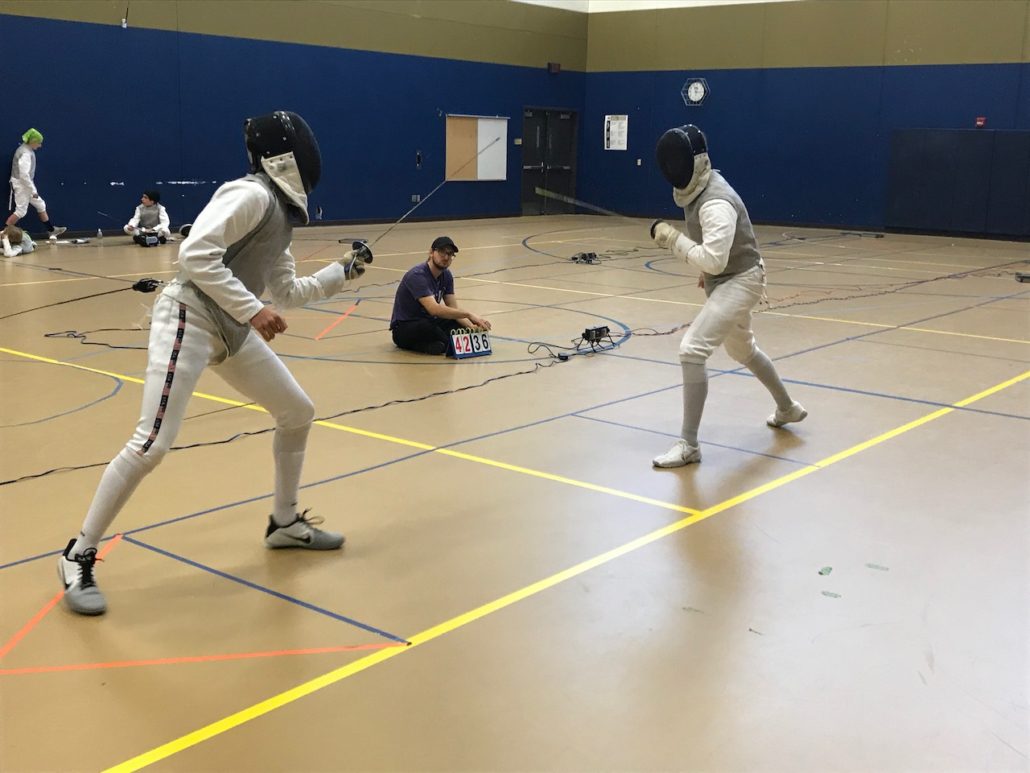
Fencing Duel
“Tennis or Fencing?”
At Macalester College, Ro Sobalvarro was on a men’s tennis doubles team and they were good. Quite good. However, in a medium sized regional tournament they found themselves paired against an exceptional pair of tennis players. At one point in the match, the other team returned Ro’s serve faster than Ro had served it. Ro looked at his coach, and the look said it all, “We’re in trouble.” Ro and his partner “Cedric” ended up losing this match.
Cedric’s brother approached them after the match and laughed, “You need more practice.” It stung.
Two weeks later, Cedric knocked on Ro’s door and said, “Check this out.” Cedric showed Ro a box with fencing gear for two in it. Two masks, two foils, etc. And a note which said, “Maybe you guys should learn a different sport.” It was from Cedric’s brother who was a foil fencer.
Ro took up the challenge and sought out a fencing class. None were to be found except through the physical education program at Macalester. Ro took to the sport quickly and within a few months was soundly beating Cedric’s brother. Huzzah!
Ro has gone on to coach the Olympic Women’s Epee team to it’s only medal. A bronze at the 2012 London Olympics. He has coached numerous teams to top finishes at World Championships, the Pan American games, and state championships here in Minnesota. Ro founded the prestigious Twin Cities Fencing Club which brings in fencers from around the country and the world to study with him.
Ro is in charge of YEL’s fencing curriculum, training of instructors and consultation on all things coaching and fencing. Ro carved an hour of time to sit down with us and share some thoughts on the benefits of fencing.
Q: What type of student athlete does fencing appeal to?
Ro: Fencing appeals to a group of students who traditional sports don’t appeal to. Football, basketball, baseball, etc. Some kids think they aren’t athletic until they find the right sport. Some kids don’t do as well in team sports, but flourish in one-on-one sports.
“Best day ever!”
One former student who is now an astrophysicist is fond of recalling an exceptional day in his fencing career. When he came to Ro, he wasn’t what anyone would consider a natural athlete. He worked hard and was very disciplined in his approach. On the “Best day ever!” he was paired against a fencer who was the USA #1 (World #5) at the time. Ro’s student went on to win and still reminds Ro of this eventful day when they meet.
The story goes to show that students may or may not be gifted athletically, but they can still excel at a sport they are passionate about.
Academically Gifted
Due to the technical nature of the sport, it tends to have a broad appeal for academically gifted students. Much like chess, fencing is very strategic and calls for fencers to measure up their opponent, find out what that opponent wants to do, and take action to thwart that opponent. The story above is only one example of an academically gifted student accelerating at this sport. It is common for fencing athletes to be proficient scholars as well.
Q: What are some of the benefits of fencing that you see as a coach?
Ro:
- Organizational skills. There is a lot of equipment in fencing and students are encouraged to manage their own gear. Even as young as the age of 10. What mom wouldn’t love to have a child with better organizational skills (I’m raising my hand as I type this).
- Self-Motivation. Students develop a motivation to become better at the sport. To participate in more events. Many students can be seen at the end of practice pleading, “One more bout…pleeaaassse!”
- Fitness, agility, strength and conditioning. Fencing requires a lot of stamina. Just look at a fencer after a 15pt match and you’ll know what we mean. It’s very athletic and calls for a variety of physical skills.
- Setting and meeting goals. Ro commonly asks fencers to bring a sheet of paper with three goals they wish to attain. They sit, discuss and put together a plan on how they can meet those goals.

- Friendship. Former students who are now in the 30’s or even 40’s will comment to Ro how the friendships they made through fencing are still a big part of their life. Often at the club, students discuss their wins and losses in fencing, but they’ll also discuss homework and other life challenges. Ro’s even witnessed students helping each other with math homework at his club. Ro says many of his students come to fencing classes to see their friends just as much as to fence.
Q: Can athletes start fencing at a later age, even in high school?
Ro: Is it harder to start as a high schooler? Yes. Can it be done? YES! One student, Solomon Polansky, started in high school. He was very athletic. Fast, quick…super quick reaction time. He went on to have great success as a high school fencer, qualifying for national competitions. Now he is on the Johns Hopkins fencing team.
Q: Is fencing safe? After all, they are poking each other with weapons.
Ro: Extremely safe. A report by Scientific American (CLICK HERE to view report) listed fencing as one of the safest olympic sports in their entire catalog. It even had fewer injuries than badminton.
Concussions in fencing are extraordinarily uncommon. Ro shares with us that his students get injured playing basketball or jogging. In fencing, they get tired, but they don’t get hurt.
Q: If Darth Vader fenced an epee match against Kylo Ren who would win? Yes, using the force to move objects and otherwise hinder your opponent is allowed.
Ro: Darth Vader has deep seeded anger issues and problems with self control. If Kylo Ren can leverage that and get under Darth Vader’s skin, it’s an easy win for Kylo Ren.
Keep in mind that the only reason Darth Vader beat Obi Wan Kenobi is because Obi Wan withdrew.
Q: What other resources do you recommend to parents looking into fencing?
Ro:
- Other parents. When you are at the club, talk to other parents. Parents are very honest when it comes to assessing their child(ren’s) enrichment activities.
- Watch the practice. As you watch a practice, ask yourself, “Is this the kind of practice I want for my kids?”
- Positive Coaching Alliance is an excellent resource for parents. Many articles about youth coaching and some things to look for as a sports parent.
- United States Fencing has a parent guide. CLICK HERE to view it.
CLICK HERE to visit our registration page and find a class near you. Don’t see your school? Call (800) 959-9261 or email us to get a program started.

